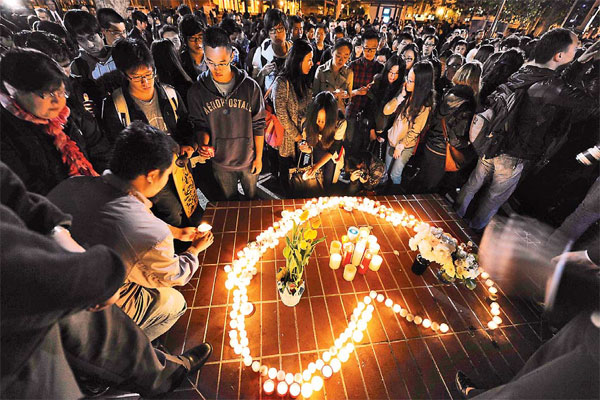
Mourners attend a candlelit vigil at the University of Southern California in Los Angeles on Wednesday for two Chinese students who were killed in what may have been a bungled carjacking. [Mao Jianjun / China News Service]

Chinese victims shot in their car in possible bungled carjacking
More than 1,000 people attended a vigil on Wednesday night at the University of Southern California campus to mourn two Chinese students who were shot dead in what seemed like a bungled carjacking around 1 am on Wednesday.
Experts called for enhanced protection of Chinese students overseas as China has become the largest source of foreign students in the US.
The victims, Wu Ying and Qu Ming, were both graduate students at the electronic engineering department. They were killed in a neighborhood northwest of the campus.
David Carlisle, in charge of the university's department of public safety, told the Beijing-based People's Daily website that Qu, the male victim, was talking in the car with Wu outside her residence when the attack happened.
The killer fired from outside the car. Despite his wounds, Qu was able to stumble onto the porch of Wu's residence and call for help before collapsing, Carlisle said. Both victims were born in 1988.
According to Carlisle, a witness driving by saw a man dash into a dark-colored vehicle after the shooting. Another witness saw two men running from the scene.
The witnesses, however, failed to describe the suspect or suspects or provide details of the car and visibility may have been impaired as it was raining.
Sources from the Los Angeles Police Department told the media that both victims suffered head wounds.
Hong Kong-based Phoenix TV quoted a source at the Chinese consulate in Los Angeles as saying that Wu was from Central China's Hunan province while Qu was from Northeast China's Jilin province.
China sends more students to study in other countries than any other nation and the university has more international students than any other US university. About 19 percent of the 38,000 students are from other countries, and about 2,500 come from China.
Alan Liu, a graduate student at the mechanical engineering department of the university, told China Daily that he and Wu attended the same aircraft design class.
Liu said Wu was soft-spoken, had a gentle personality and was a diligent student.
Both were on their way home after studying until midnight at the library.
"Our community is saddened and outraged by this callous and senseless act," the university said in a statement.
"Our hearts and prayers go out to the victims' families and friends and all who knew them at the university. The university is reaching out to those affected, offering counseling and support."
Leon Li, vice-president of the Chinese Students and Scholars Association at the university, said that the association will try to comfort friends and colleagues of the victims. The association is also trying to contact the victims' family members in China both to offer comfort and arrange a memorial service.
The association plans to organize a safety seminar for students.
Six people have been killed in the area this year, police said. Last year, 21 people were killed.
According to a report released by the US-based Institute of International Education, China sent more than 157,000 students to US universities last year, more than any other country.
The agency also said Chinese students account for 21.8 percent of international students in the US.
They contribute more than $21 billion to the US economy.
The USC tops US institutions for hosting the largest number of students from China.
Xia Liping, deputy dean of the department of diplomacy with China Foreign Affairs University, said that there may be an impression overseas that Chinese people are wealthy and this could contribute to increased risk.
Contact the writers at [email protected] and [email protected]
Wang Chenyan and Zheng Xin in Beijing and Kimia Mostaghimi in Los Angeles contributed to this story.